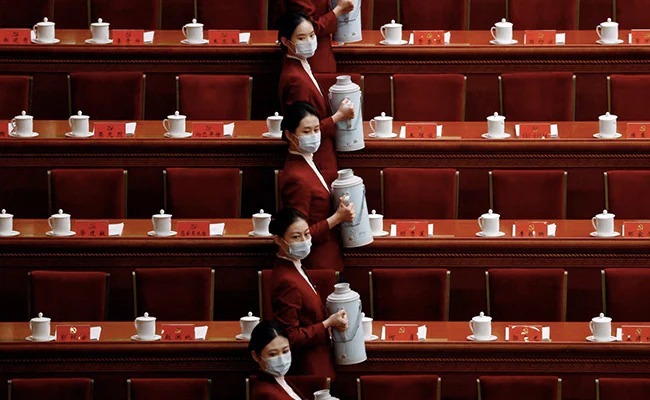| Translate This News In |
|---|
Chinese women are not holding their breath for advances in gender equality as Xi Jinping consolidates power at this week’s 20th Communist Party Congress of China.
Academics and activists claim that during Xi’s ten years as the party’s general secretary, fewer women had positions in politics and high-level government positions, and the gender wage gap grew. Additionally, they note that the government has recently emphasised more and more the importance of the traditional roles of women as mothers and caregivers while silencing feminist perspectives.
Gender equality is established in the constitution of the People’s Republic, which was founded by Mao Zedong, who is renowned for saying “women hold up half the sky.”
According to Cheng Li, a Chinese politics expert at the Brookings Institution, power has grown much more consolidated under Xi compared to 10 to 15 years ago when rival coalitions in Chinese politics competed to win over women, which led to greater female participation.
According to the current trend, women are frequently appointed as deputy or in other symbolic roles, he noted.
The party’s top leadership body, the seven-member Politburo Standing Committee, is expected to remain all-male, as it has traditionally been, at the congress, which is held every five years.
Shen Yiqin, a regional party boss, is the sole clear candidate for one of the 25 positions on the Politburo. It is anticipated that Sun Chunlan, the only female member now serving and the driving force behind China’s zero-COVID policy, will retire at the age of 72.
The central committee, which ranks second in the party’s structure, has a total of 371 full and alternate members, with 30 places, or 8%, now held by women. Compared to 2007, 10% less now. Only two of China’s 31 province governors are women.
The paucity of senior female legislators appears to be at odds with the Communist Party’s general effort to expand female participation, which saw the percentage of women party members rise to 29% in 2021 from 24% in 2012.
Women have advanced considerably in China in some fields, most notably the economic world.
According to a study by global index provider MSCI, women made up 13.8% of board directors at Chinese companies in 2017 compared to 8.5% in 2016. According to the government, women established over 55% of Chinese tech businesses.
However, experts claim that women have experienced significant defeats as a result of the paucity of female political leaders.
China has made “solid development in women’s concerns” over the past ten years, and its women have equal rights, according to a Sept. 27 statement on the Federation’s website.
“GOOD WIVES, GOOD MOMS”
China has fallen from 69th place in 2012, the year that Xi took office, to 102nd place in the World Economic Forum’s rankings of 146 nations for gender disparities, despite the fact that many nations have made strides in reducing these inequalities in the workforce, in education, in health, and in politics.
The situation has undoubtedly gotten worse, but that doesn’t imply it was good before; it has always been horrible, it’s just that exploitation has gotten easier, according to Grace Wang, a 28-year-old.
Wang claimed that she has experienced gender-based discrimination in the past when applying for advancement, and that she is currently dealing with the same issues at work.
“Making money to get by is all I’m thinking about in terms of my career right now.”
In a positive development, China announced intentions to change a law in December to better protect women from sexual harassment and discrimination at work. Tens of thousands of individuals have offered their suggestions for changes to the law.
Experts and campaigners are worried about the government’s increased emphasis on the value of women’s traditional duties as it works to address China’s demographic issues, which include one of the lowest birth rates in the world, a growing unwillingness to have children, and a fast ageing population.
For instance, in a speech in July 2021, Xi stressed the significance of gender equality while also urging Chinese women to carry out the “mission of their times, closely link their future and destiny with the future and destiny of the motherland.” She also emphasised the importance of women in China being “good wives, good mothers.”
More tangible disadvantages for women’s rights are also mentioned by experts.
With the emergence of the MeToo movement in China in 2018, feminist activism seemed to be gaining ground there. However, the authorities quickly put an end to it by forcibly cancelling events, censoring internet conversations, and arresting activists.
According to activist and former founder of the now-defunct online Chinese media outlet Feminist Voices Lu Pin, who now calls New York City home, the feminist movement is currently very frail and lacks the freedom to develop. Many social movements have also been repressed.


















